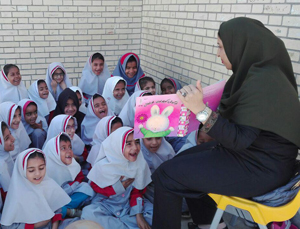
Yesterday, Iran literacy project Read With Me was announced as a candidate for the 2018 Astrid Lindgren Memorial Award (ALMA)—the world's largest children's literature prize, designed to promote interest in children's and young adults' literature.
Each year, the award’s jury selects nominating bodies from around the world, all of which must demonstrate “expert knowledge” of children’s and young adult literature. ILA was one of only six U.S. organizations, among 226 total nominating bodies, to nominate a candidate this year.
As ILA’s nomination committee members began to discuss potential candidates, they looked at previous award winners. How had they used the funding? How many lives had it changed? The committee wanted to support a cause that would have a far-reaching and sustained impact.
“We felt strongly that a project that could really monetarily use the support in the most impactful way was the one we wanted to support,” said nomination committee member Junko Yokota.
It didn't take long for Zohreh Ghaeni’s name to come up. Yokota had served alongside Ghaeni on several international award juries, including the International Board for Books of Young People, and had continued to follow her work in promoting children’s books in Iran.
A lifelong activist, Ghaeni was twice arrested and detained for her political beliefs, journalism, and human rights defense work, which focused on youth education.
“From the time I was 19, I knew I wanted to work with children in poor villages. I was so worried about the children that I left my university learning to work directly with them. I brought books from Tehran, I read to them, I played with them out in nature,” said Ghaeni, in her personal statement. “That was the first time that any teacher had come to them to offer such an opportunity. But teaching 20–30 children was not enough; I wanted to do more.”
During her second, eight-year-long term in person, she did not have access to books—an experience that served as a harrowing reminder of the power of words. Once released, she began to research the history of children’s literature as a means of ideological control. Ghaeni realized she may not be able to change the education system that was oppressing young minds, but she could empower the children to help themselves, through literature.
Her time spent in prison inspired her to found Read With Me with the goal of promoting lifelong reading habits in underserved areas in Iran. Today, the organization leads two-day workshops every three months for teachers, librarians, and volunteers, who learn how to facilitate productive read-aloud and discussion, foster literacy skills, and lead creative activities that support learning.
Over the past decade, Read With Me has reached more than 7,000 children and young adults across 75 remote villages in Iran, trained more than 500 teachers, distributed 25,000 books and 60,000 learning activities, and established more than 90 Read With Me small libraries.
Beyond these numbers, Ghaeni said the most important measure of success of Read With Me is the impact on children, teachers, and volunteers involved. Not only have the children developed a love of books, but have shown improved vocabulary, pronunciation, comprehension, concentration, communication, confidence, critical thinking, and problem-solving skills.
Yokota said that collaboration is at the core of everything the organization does.
“Even the name, Read With Me, was very intentional. They don’t read to the children, they read with the children,” she said. “That kind of deep thinking can be found in every aspect of the organization.”
The committee members also recognized the organization’s emphases on high-quality literature, paired with strong professional development—key tenets of ILA’s mission.
“It’s an approach that allows teachers to get training in how to use the books with children, how to engage them to use lit in meaningful ways,” said Miriam Martinez, chair of ILA’s nomination committee. “It not only encompasses good literature, but empowers teachers with professional development.”
If awarded the prize, Ghaeni plans to expand the organization’s operations and continue to help more children and young adults make meaningful changes in their lives.
The recipient will be announced in Stockholm and Bologna following the jury’s final meeting in March 2018.
To learn more about Read With Me, visit the organization’s website and YouTube channel.
To learn more about the Astrid Lindgren Memorial Award, visit alma.se/en.
Alina O'Donnell is the editor of Literacy Daily.